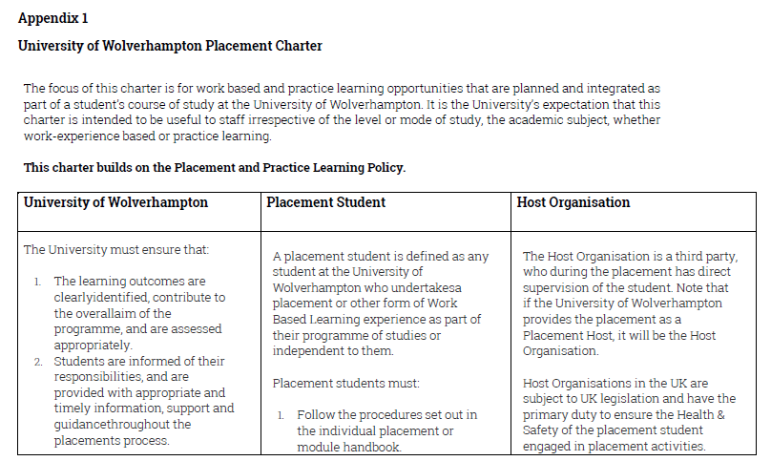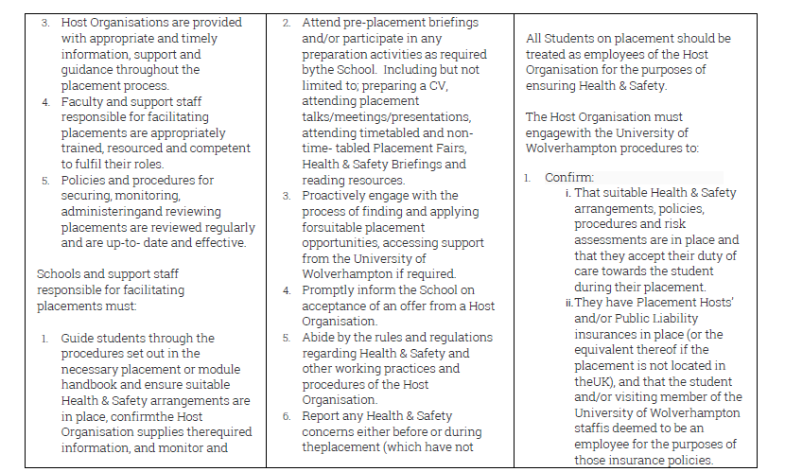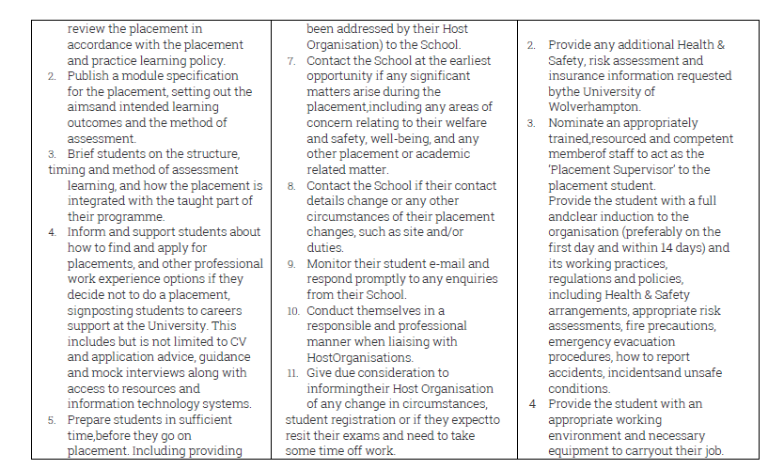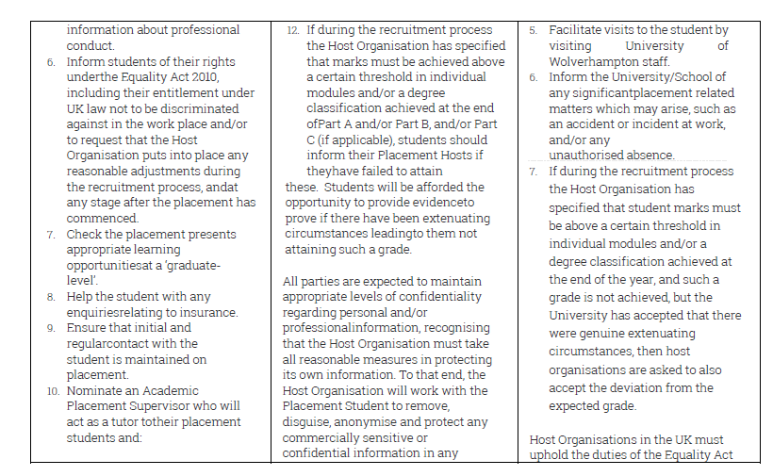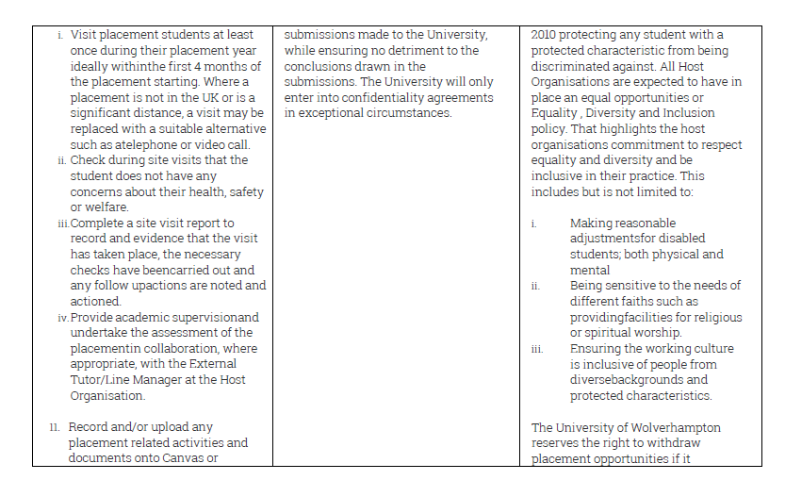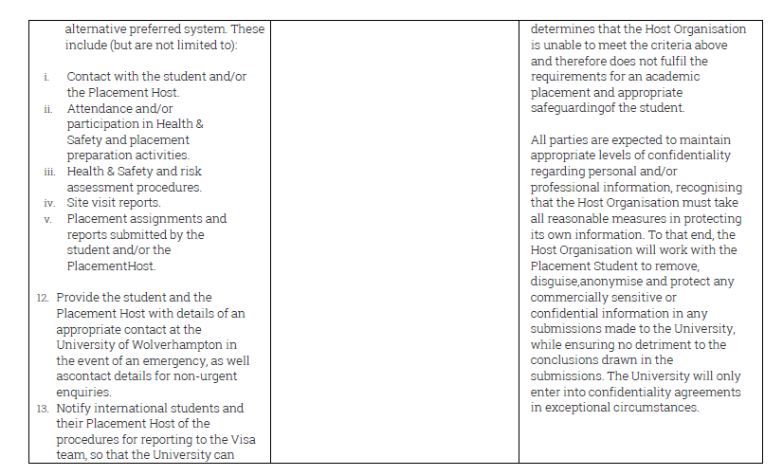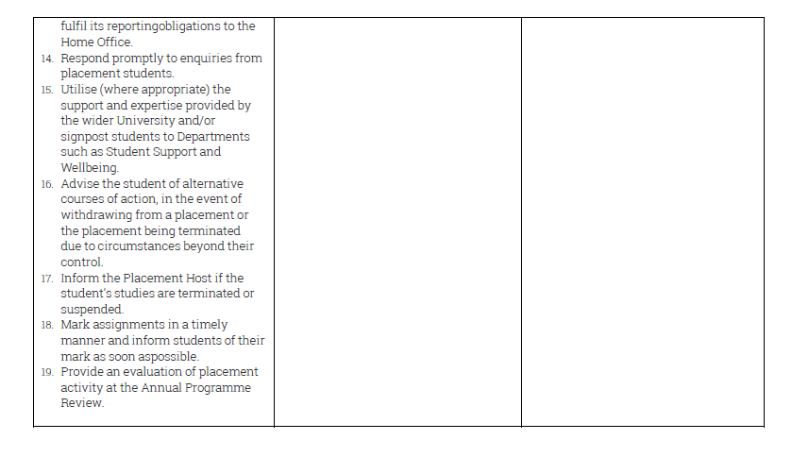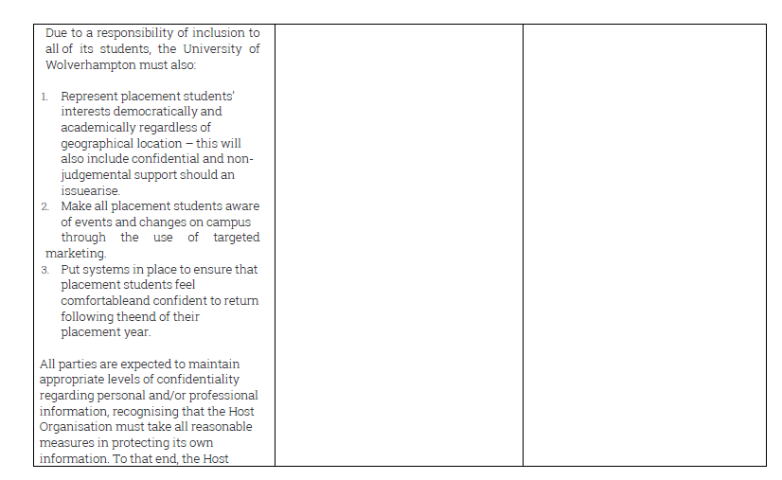POLICY/PROCEDURE
The University of Wolverhampton is committed to developing and maintaining constructive relations with its students and external placement providers. This Policy has been approved by the University’s Executive Board. It sets out the University’s requirements for planning and integrating placements and practice based learning for students into courses of study.
The focus of this policy and accompanying Placement Charter in Appendix 1, is for work based and practice learning opportunities that are planned and integrated as part of a student’s course of study at the University of Wolverhampton. It is the University’s expectation that this policy is intended to be useful to staff irrespective of the level or mode of study, the academic subject, whether work-experience based or practice learning.
2. Details of Policy
The objectives of this policy are to ensure a minimum standard is established and support the development of good practice and consistency of application throughout all faculties.
The implementation of this policy is in accordance with the University’s core values which are to be:
- Ethical
- Respectful
- Transparent
- Inclusive and fair
- Challenging
- Confident
- Collaborative
- Professional
Practice learning is important in that it helps to bring together academic theory and workplace practice, integrating working with learning. Practice learning is in part about increasing a student’s employability, but can also form a significant element of a qualification and therefore must be considered in the same manner as other forms of learning, teaching and assessment when it comes to quality and standards at the University of Wolverhampton.
3. Scope
Practice learning is integral to a broad range of courses at the University of Wolverhampton. Therefore, this policy is intended to ensure oversight and consistency in how to design and manage practice learning in a manner which is robust and meets the requirements of the UK Quality Code and other professional and practice regulatory body (PSRB) standards. The QAA sets out 9 guiding principles covering expectations and practices for work based learning. The full list of principles can be found here.
Where a collaborative agreement with a partner [1]of the University devolves to that partner the responsibility for the arrangement and/or management of a practice, the partner should adhere to this policy.
The Practice Learning Policy has been informed by the following external reference points:
- ASET ‘Good Practice Learning Guide for Work Based and Placement Learning in Higher Education’;
- QAA UK Quality Code Chapter B10 ‘Working with Others’
4. Responsibilities in Relation To This Policy
Academic staff supporting students with placements and practice based learning and all relevant support staff are responsible for ensuring the guidelines of this policy are carried out on behalf of the faculty and the University, giving consideration and providing information to any relevant parties of the University relating to their required responsibilities as detailed in the policy. Please refer to the University of Wolverhampton Placement Charter in Appendix 1 for more information about the responsibilities of the University, the host organisation and any students undertaking a placement or period of practice based learning.
Apprenticeships are not included within this policy and are managed by the Apprenticeship Hub.
5. What To Do If You Need Support With This Policy
For general guidance on this policy, please contact the Compliance team at the University by email at compliance@wlv.ac.uk.
[1] Educational partners who deliver University of Wolverhampton awards.
6. Types of Practice Learning
In general, practice learning will take one of two forms:
- Where courses require external partners to be formally involved with the delivery of teaching, learning and assessment in practice the University must be confident that the host partner organisation has the capacity and capability to assume that responsibility to the standard required by the University.
- Where employers/host partner organisations are not formally involved in assessment of learning the University must be confident that the host organisation has the capacity and capability to provide and support learning opportunities.
Further information on this type of work-based learning can be found below:
|
Type of practice learning |
Definition |
Policy Requirements |
|
Practice Placements |
Governed by a formal agreement by the University of Wolverhampton, compliance requirements as appropriate and the host partner organisation, these practice experiences are usually undertaken on courses where a qualification leads to a licence to practice such as in health, education and social care. Students will often complete multiple practice experiences as part of their course of study and organisations will be involved in the assessment of student learning. |
Please refer to individual practice placement handbook on Canvas for specific requirements. For example, assessment deadlines and learning outcomes. Refer to contract between the University and organisation for health and safety and placement documentation. All documentation can be found on individual Canvas topics. |
|
Work-experience |
Short term informal learning activities where a student will spend time on employer premises but may have no formal contract (depending on the organisation). |
The host organisation is required to complete the University’s health and safety and risk assessment documentation (which can be located in Appendices 2 & 3). |
|
Sandwich placements (optional) |
An equivalent of a year’s academic study typically (30 – 52 weeks, as agreed by School), an optional element undertaken by undergraduate students as the penultimate year of their programme. |
The host organisation is required to complete the University’s health and safety and risk assessment documentation. Placement handbooks can be found on related Canvas topics. If an international student has secured a placement they will be required to submit monthly timesheets to the Visa team (visa-enquiries@wlv.ac.uk). |
|
Master’s professional practice placement |
A 3 month placement that students undertake as part of their degree. The placement is required to be at a physical location and not virtual or work from home due to the visa guidelines. For more information on this please speak to the Visa team. These students will also need to complete weekly timesheets. Failure to attend a placement or adhere to this timesheet requirement may be reported to the UKVI. |
All paperwork is collated and approved by the placement academic which the student is required to upload onto Canvas. Paperwork includes health and safety documentation, risk assessment, insurance, details of Next of Kin, an offer letter with a start and end date and whether the placement is paid or unpaid. |
|
Semester placements |
A full-time placement would be equivalent to a full semester (9 - 15 weeks depending on the calendar). A part-time placement could be 1 or 2 days a week on placement (integrated with usual academic study). This can also include voluntary work which can be independent to, or as part of a module where the student is assessed not by their performance, but on the written piece associated with the volunteering. |
The host organisation would be required to complete the health and safety and risk assessment documentation. The documentation should then be returned to the relevant academic to store and review as appropriate to the faculty. |
|
Internships |
A short-term placement opportunity usually offered and advertised by employers, although may also be secured through a speculative application. Taken by students at any level of study at a vacation time or part-time during an academic year. The term may also be used to describe opportunities for new graduates. |
If internship is undertaken during the summer vacation, health and safety and risk assessment documentation are not required by the University as the student is not enrolled on a course. The host organisation would still be required to complete the above health and safety documentation independent to the University. If internship is completed during academic year, health and safety and risk assessment documentation will be required. |
|
Semester or year abroad |
When a student opts to study at an overseas education provider which has collaborative/reciprocal agreements with the University of Wolverhampton, this could include a period of work or may be study only. This may be part of, or additional to, their degree e.g. The Turing scheme (The Turing Scheme - University of Wolverhampton (wlv.ac.uk)). |
Health and safety and risk assessment documentation would be required from the host organisation, as well as travel insurance documentation from the student, passport information, discussions of interactions with the student concerning Foreign and Commonwealth Office country travel advice and any record of meetings to discuss and manage expectations of the student. For further information or support on this process, please visit the government foreign travel advice website here.
|
|
Work based awards |
A course where the employment setting is used as a contextual focus for the learning regularly throughout the course. |
Health and safety and risk assessment documentation is required from the host organisation. If credit bearing module, information will be found on the Canvas topic. |
|
Volunteering |
Is a voluntary act where an individual or group freely give their time and labour for community service. This can either be short term or long term and may be independent to, or as part of a module. |
See information above (work-based awards). |
|
Placements abroad |
A work placement undertaken by a student abroad as part of their degree. Higher education work placements and internships should last between two and 12 months. |
Health and safety and risk assessment documentation is required from the host organisation, as well as travel insurance documentation from the student, passport information, discussions of interactions with the student concerning Foreign and Commonwealth Office country travel advice and any record of meetings to discuss and manage expectations of the student.
|
|
Live projects |
A brief set by an external organisation for students to complete as part of a module. Informal (not assessed) feedback is provided to the student by the external organisation and the work then forms part of an assessment portfolio. |
7. Governance Framework
The University should ensure that it maintains “proper control of the academic standards of courses where learning opportunities are delivered with others”[1]. The inclusion of practice learning as an integral part of a course of study must therefore be approved as part of the overall course approval process and must be monitored and reviewed as part of the usual monitoring and review process. Guidance can be located here: Course Approval & Deletion - University of Wolverhampton (wlv.ac.uk).
8. Equality and Fair Access to Placement Opportunities
The University of Wolverhampton is committed to encouraging equality, diversity and inclusion in our student placements, and eliminating unlawful discrimination. We would also expect the latter from our partners, thus ensuring they comply with equalities legislation. The aim is for our students on placements to be truly representative of all sections of society and to feel respected and able to give their best. The University has a general equality duty to have due regard of the need to:
- Eliminate unlawful discrimination or other conduct unlawful under the Equality Act 2010
- Advance equality between people who share a protected characteristic and those who do not
- Foster good relations between people who share a protected characteristic and those who do not
The University will advertise placements through the University jobs board and through the course Canvas topics and we will offer additional support to those students with protected characteristics through the annual Inclusive Careers Conference (ICC), through our work with Disability Confident placement providers and by signposting to external organisations such as EmployAbility who can offer further specialist support to our students (Equality, Diversity & Inclusion - University of Wolverhampton (wlv.ac.uk).
In addition to this, all University of Wolverhampton students undertaking any type of placement or period of practice-based learning should be encouraged and supported to flourish, both by the University and by the placement provider itself. It is an expectation that clear and open communication will take place between the placement supervisor and the student, as well as the host/partner organisation and the student before the placement begins to discuss any religious, cultural or additional needs that the student may have and reasonable adjustments and/or support mechanisms that could be implemented. This could include for example, wearing of religious articles of faith (e.g. Turban and Hijab), the observation of sabbath days or religious festivals such as Ramadan, Eid or Vaisakhi, support and guidance for periods of fasting, requests for suitable prayer areas and breaks to pray, specific dietary requirements, or private areas for new mothers to breastfeed and/or express.
Further guidance on supporting the spiritual, cultural and pastoral needs of placement students can be requested from The University Chaplaincy.
9. Implementation
The School should seek to ensure the suitability of the host organisation for the University to work with and must have appropriate processes in place to ensure the suitability of placement hosts and to meet any regulatory and professional body standards (where appropriate). All non-professionally accredited placements should be checked through the relevant government agency such as Company House to ensure the host organisation is legitimate.
The University/School should approve any publicity relating to practice opportunities on its course and suitable opportunities should be included on the University’s jobs board.
Appropriate levels of staffing should be committed to the management and support of practice learning. All staff should be prepared and supported to undertake their practice related responsibilities. There should be documentary evidence to record that staff have been given this preparation. Academic staff will be informed of their responsibilities and guidance given at School level.
Students undertaking practice learning should be prepared and supported in their practice learning activities. There should be documentary evidence to record that students have been provided with this preparation.
Practice partners should be appropriately prepared and supported to undertake their required level of responsibility according to the defined type of practice learning.
Evidence of a host partner/organisation practice suitability check, undertaken by the University and a-tri party written agreement, signed by all 3 parties (student, University and practice provider), to confirm roles, responsibilities and authority should be in place before the start of any period of practice learning. This will be checked and managed at faculty level.
In the case of regulatory practice placements that form an essential part of an award, these placements are professionally bodied accreditation placements, for example in health, social care and education, this suitability check will be signed by two parties, these being the University and the practice partner. The roles and responsibilities for the student will be laid out in their programme/course handbook.
The host/ partner organisation must be provided with a named nominated contact at the University to use in case of an emergency, enquiry, complaint or to raise concerns. This will be the relevant placement academic related to the course. The University must also be provided with a named contact at the host/partner organisation.
A process must be in place to enable students to reflect on their learning experience both whilst in practice (for example, through the use of a reflective diary or regular meetings with a mentor/workplace supervisor) and after the period of practice learning has ended. The frequency of meetings should be discussed between the academic placement supervisor/module leader and the student. Each placement assessment will have its own learning outcomes which can be found through the student’s assessment and practice supporting documentation.
In the case of regulatory placements in health, social care and education these will be clearly defined through the student’s assessment and practice supporting documentation.
A process should be in place to secure feedback from students, (which can be developed at School level) University staff and practice providers. This should feed into the annual monitoring processes. There is an expectation that this feedback will be evaluated and fed back to students and/or student groups. As it is recognised that students respond to different approaches, Schools should also seek to obtain feedback from students via non formal means, for example during casual class discussions.
Schools should ensure that all relevant University/school processes and procedures to manage any complaints, concerns and fitness to practice issues arising on/or as a result of practice, are available to practice providers, students, service users and University staff.
All students should be encouraged to engage with the employability adviser or other relevant member of staff from their faculty to receive support on the application process for placements/professional practice and to develop their employability skills. This includes guidance on writing a professional CV, participating in a mock interview and identifying essential skills that are necessary to succeed in a professional work environment.
10. Where Practice Learning is Integral to Course Design
The overall aim and learning outcomes for the practice-based element of the course must be articulated in the course specification. Where appropriate, the course design must ensure that the requirements of relevant regulatory and professional body or employers consulted as part of the course design and validation process are reflected in the delivery of practice learning.
In particular, for sandwich placements consideration must be given to University regulations to ensure that assessment requirements are fully met. These assessment requirements can be found in the module handbook which is located on Canvas.
Consideration should be given to the implications of students not securing or needing to change their practice learning. This should be made clear in the course handbook or specific practice handbook.
[2] QAA (2012) UK Quality Code for HE: Chapter B10 ‘Managing HE provision with others’: Gloucester: QAA p24 Indicator 8.
Faculty staff including lecturers, personal tutors and academic coaches must ensure that students undertake appropriate preparation before their period of practice learning and are provided with the knowledge and resources necessary to achieve their learning outcome(s) in practice. This includes engagement with any workshops on professionalism and good conduct within the workplace that may be delivered through the school, as well as online employability resources including CareerSpace which can be found here.
Schools will usually provide clear information where the preparation required is mandatory and a condition of attending the placement. This includes but is not limited to training such as safeguarding.
A handbook or specific practice handbook should provide students with information to support their period of practice learning. This information should be openly available to students and provided in advance of the practice learning/placement.
The following is recommended as a minimum requirement:
- Introduction to a period of practice learning and identification of learning outcomes to be achieved in practice
- Identify assessment processes to be followed (where applicable)
- Responsibilities of the student
- Responsibilities of the practice tutor
- Responsibilities of the practice provider
- Named contact information for support at the University
- Information and processes for students experiencing problems/concerns during their period of practice learning
- Schedule of practice visits (where applicable)
- Details of all relevant practice documentation
- Practice visit record (where applicable)
The course team must ensure that the practice host organisation is provided with access to a handbook or specific practice handbook which should include a named contact at the University. Schools should also ensure that due regard is paid to any placement undertaken in an environment that could be distressing, for example in a clinical setting. Appropriate preparation should be carried out before the placement; with additional feedback and a debriefing as best practice once the placement has been completed. For any student expected to work remotely, if the period of practice learning is short term[3] or informal, the student undertaking the practice learning would be expected to use their own IT equipment, for example laptop, as they would for their own academic study. There is also the option to loan equipment from the library service for the short term. If the period of practice learning is long term, the host organisation would be expected to provide IT equipment for the duration of the placement as required and if specialist software is needed.
11. Practice Setting Suitability
In all cases the University/faculty is responsible for ensuring the host partner organisation and the practice settings, suitability to support learning in practice. This should include a pre-placement visit by the placement supervisor if deemed necessary by the faculty.
The University/faculty should ensure that the practice setting, the working environment and the arrangements for support are approved prior to students undertaking their practice experience. Responsibility for approval will be dependent on the subject and level of risk of placement (this will be obtained through the risk assessment (Appendix 3), i.e. lab technician and construction opportunities which are approved by the academics within the subject areas. International Master’s placements are approved by the academics as they are a compulsory element of their course.
13. Conducting Practice Setting Suitability Checks
Please note that this information is not applicable to regulatory placements in health, social care and education where the mandate for checking placements must meet regulatory compliance and separate processes exist. Including the audit process currently in place and hosted on eVision. This is complied with professional regulatory requirements in health of the Nursing and Midwifery Council (NMC) and Health and Care Professions Council (HCPC), who validate and regulate the relevant courses. All providers also have an annual audit to remain live and comply with requirements with include Care Quality Commission (CQC) and OFTSED monitoring.
University Level
A suitability check of the host organisation should be completed using the Placement Provider – Insurance and Health & Safety form (PP3) provided in Appendix 2. The form may be adapted as required, to reflect different School/course level requirements.
Indicator 6 in Chapter B10 of the UK Quality Code advises that such enquiries should be “proportionate to the complexity and volume of the provision involved and the risks it may present”.[4]
Organisations who are deemed to be high risk may still be used, but the School/department should mitigate against this risk (e.g. by the use of additional interactions) and record this action on the form (Appendix 2).
School Level
An educational suitability check of the individual practice setting, and risks associated with the intended practice activities should be carried out by the school, using their agreed (and designed) documentation usually agreed with the regulatory body, prior to any students embarking on a practice placement. This is to assure that the practice setting is an appropriate learning environment to deliver the intended learning outcomes.
All documentation should be signed for approval by the course leader or other appropriate member of School/partner staff.
It may be necessary for the school to check any contracts of employment given to students undertaking practice learning from the host organisation. In the case of international master’s students undertaking a placement, academic staff will need to approve the placement and all paperwork. For all courses where practice based learning is compulsory, academic staff will need to approve both the placement and all paperwork given to the student from the host organisation. For any practice based learning that is an optional element, the placement is required to be relevant to the degree and suitability checks will be carried out to confirm this. Any requests for confirmation and further information will be requested once the health and safety paperwork has been returned from the host organisation.
Students sponsored by the University of Wolverhampton under the Student Route must have their placement details reported to the UKVI prior to the placement taking place. The Student Visa Compliance and Advice team should be notified of the placement as soon as it is approved to ensure the placement details can be reported to the UKVI. The detail provided must be the placement start date, end date, placement address or any changes to a student’s placement. This information would be required to be submitted by the placement academic for each module (Contact Us - University of Wolverhampton (wlv.ac.uk).
14. Health and Safety
The University in addition to any host organisation has a duty of care for all of its students under the Health and Safety at Work Act 1974 and the Management of Health and Safety at Work Regulations 1999.
Primary responsibility for the health and safety of the student will lies with the host organisation. The student has responsibilities to follow instructions and act sensibly to protect their own health and safety and that of others. The organisational checklist and all School documentation should seek to ensure that all host practice organisations are fully compliant with all health and safety legislation and have a written health and safety policy. In cases where compliance cannot be guaranteed host organisations should not be used for practice learning.
The host organisation should complete a work place risk assessment for all activities that students undertaking practice learning carry out. The work place risk assessment form (pp4) is included in Appendix 3.
All accidents and near misses that occur within a practice organisation should be reported to the University as per the accident and near-miss reporting procedure. The reporting of accidents is vital to the welfare of students undertaking practice-based learning, as well as being key to the prevention of further accidents and should be completed as soon as possible. In addition, the Reporting of Incident or Concern form in Appendix 5 should also be completed.
Further information on the accident reporting procedure including the required form can be found here.
It is expected that host organisations treat placement and practice based learning students as they would an employee and have robust absence management policies in place to ensure that the safety and wellbeing of students can be tracked and any cases of unknown absences can be investigated in the first instance. For example, if a student fails to turn up for their placement it would trigger an escalation of checking their whereabouts including contacting the student, contacting the nominated point of contact at the University and/or contacting the relevant authorities if concerns are present. All students involved in any type of placement activity will be advised to seek personal insurance, not as a replacement, but in addition to that provided by the placement site.
15. Safeguarding and Prevent
All host organisations have a duty of care to students undertaking practice based learning and should recognise the importance of maintaining good health and wellbeing within a practice-based learning setting, as well as the benefits this brings to both the employee of the host organisation as well as the host organisation itself. The University and the placement provider should work closely together to reduce mental health and wellbeing risks, before, during and after a period of practice learning and recognize how the transition to a professional workplace environment can have a significant impact on the student’s mental health and wellbeing,
Universities UK (UUK) has published a checklist for universities to help them to support their students throughout the period of practice learning. This builds on the approach set out in the UUK–Papyrus Suicide-safer universities guidance and includes the following recommendations. The full publication can be accessed here.
- Check in advance of the placement that the workplace setting has properly considered wellbeing and has clear routes for support when people need it.
- Ensure that wellbeing is a key part of pre-placement briefings and training, such as techniques for maintaining a good work/life balance, or preparing healthcare students for potentially upsetting and traumatic situations.
- Establish a key university contact for each student and provide students with opportunities to ‘check-in’ with that person on both a scheduled and unplanned basis if needed.
- Similar check-ins should happen once the placement has ended, to ensure students are settling back into university life and that any support that was in place prior to their placement is continuing.
- Work with the placement provider to set-out a clear process for unnotified or unexplained absence reporting, so it is clear how concerns for a students’ whereabouts or welfare would be escalated to the University.
- Provide study skills workshops to help students feel more confident returning to academic life, and encourage networks for placement students to keep in-touch and support each other at this time.
Further information on the range of support available to students from the Student Support and Wellbeing team at the University can be found here.
The University of Wolverhampton takes seriously its responsibility to safeguard and promote the welfare of any member of the University community and to work together with other agencies to ensure that adequate arrangements are in place to identify, assess, and support any member of the University community who may be suffering from abuse, harm or neglect.
The University also demonstrates a strong commitment to advocating the Prevent strategy and recognises its role as an organisation to be diligent to the need to prevent its students, employers and wider community from being drawn into terrorism and/or being radicalised. The University expects all host organisations to recognize the importance of this and have relevant procedures and training policies in place to work towards this.
Any areas of concern should be reported in the first instance to the relevant contact in the School and other relevant parties in the University.
Further information on the University’s policy and responsibilities regarding safeguarding can be found here.
[3] There is no official length of a short term placement, it could be a set period of hours, days or weeks set by the course leader.
[4] QAA (2012) UK Quality Code for HE: Chapter B10 ‘Managing HE provision with others’: Gloucester: QAA p24 Indicator 8
All staff and students travelling internationally on University business must obtain approval prior to making any arrangements from a member of the University Executive Board. All University staff should refer to the International Travel policy here for further information (WLV Policies - University of Wolverhampton).
All staff and students travelling on University business (for example, to a placement or field trip abroad) are expected to keep their faculty/Global Opportunities (Contact Us - University of Wolverhampton (wlv.ac.uk). fully informed of any international travel they are planning to make and to take all reasonable steps to research the risk associated with their planned activities. In particular, they are required to keep abreast of any changes in risk classification on their destination by checking the Foreign Commonwealth and Development Office (FCDO) published advice (Foreign & Commonwealth Office - GOV.UK (www.gov.uk).
In cases where students will be travelling abroad, Global Opportunities should ensure that the host practice organisation contact details are recorded and that a risk assessment is completed. The risk assessment form for international placements is the same as for UK based placements (Appendix 3).
Further guidance and support can be located in section 17 of the policy,
Global Opportunities must ensure that students undertaking international travel as part of a programme of study are suitably trained, knowledgeable about their destination and experienced to do so.
Global Opportunities should also store copies of insurance documentation, student passport (checked and verified), discussions with the student concerning Foreign, Commonwealth and Development Office country travel advice and a record of a ‘contextualisation meeting’ being held, the focus of which should be to manage student expectation relevant to their country of travel.
The University has travel cover in place for both staff and students travelling overseas on University business. Faculties/Global Opportunities must ensure that a Business Travel Certificate is completed for those individuals who require travel cover. A copy of the completed Certificate should be retained by the traveler as it is their only evidence of cover.
Schools are reminded that the University Travel Cover may be invalidated in cases where travel is allowed to proceed against specific FCDO advice.
For guidance and support on travel insurance please contact Insurance@wlv.ac.uk.
As a minimum, weekly wellbeing checks should be conducted with any students undertaking any type of placement overseas. These checks will cover areas such as travel, accommodation, the placement and organisation and funding. The checks can be carried out via email, telephone or video call as necessary and should be stored at a local level.
17. Practice Support
The University is committed to providing a high level of appropriate support to all students undertaking a placement or a period of practice based learning.
For some courses it will be appropriate for a University tutor to undertake a practice visit. Where this is deemed appropriate the number of visits and the expectation of these visits will be defined in a handbook or specific practice handbook. Some subjects currently have visits from academic staff during their 12 month placement, depending on the course. Other subjects have to deliver a presentation on campus and currently no academic visits to the placement provider. If an enhanced DBS is required to visit the placement environment this should be confirmed through the faculty and by the host organisation. Individual requirements for site visits including identification, specialist clothing and who to report to should also be confirmed by the host organisation. Where distance and location is deemed a factor, it may also be appropriate to carry out meetings on a virtual basis utilizing applications including Microsoft Teams.
Practice visits and their outcomes should be recorded and mechanisms for progressing and escalating any concerns raised in practice should be devised by the School.
Supervision during a period of practice learning will be identified through the tri-party written agreement or clearly stated in the programme/course handbook in the case of regulatory assessed placements.
All students undertaking any type of practice learning should have regular reviews conducted with their on-site supervisor to monitor their progress and allow for an opportunity to voice any concerns. The On-site Placement Supervisor’s Report (PP6) has been included in Appendix 4.
All host organisations should have a clear policy in place to report any incidents or areas for concern in the first instance. The Reporting of Incident or Concern form has been included in Appendix 5.
For students studying in the UK on a tier 4 visa, additional requirements may be needed to ensure that the students’ practice arrangements can be monitored in accordance with visa requirements. This may mean that a course team needs to undertake additional monitoring.
18. Assessment of Practice Learning
The assessment criteria for practice learning must be clear to all involved and must be included in the handbook or specific practice handbook. Practice assessment should be designed by the academic lead for the module to ensure outcomes can be completed within a set time frame to facilitate student progression to level/stage.
Practice learning which is a planned and integral part of the course, for example in health, social care and education, must be assessed by an appropriately qualified practitioner, as defined at the point of course approval. All programmes have regulatory requirements in health set out by the Nursing and Midwifery Council (NMC) and the Health and Care Professions Council (HCPC) that set out their definition of an appropriately qualified practitioner. This information is contained within all assessment documentation for students and ensures transparency across all programmes.
Where staff at the practice host organisation are involved in supporting and/or assessing students learning the School should work collaboratively with the host provider to deliver relevant staff development for nominated members of staff to competently undertake their role. Faculty course leaders will be responsible for ensuring that any staff development is undertaken as necessary.
19. Termination of Practice Learning
In circumstances where it is necessary to terminate the period of practice based learning earlier than originally agreed, this should be discussed at the earliest opportunity and communicated between all parties involved to try and come to a resolution where possible. If no resolution can be reached, all parties should withdraw from their side of the contract with a high standard of professionalism. Students should then receive appropriate support to identify next steps from both their school and other relevant staff at the University as necessary. A Termination of Contract from Placement Provider (PP8) form has been included in Appendix 6.
Any students terminating their placement early would potentially fail their module and should refer to University or Programme/course guidance for more information at the earliest opportunity. There are many reasons that students would need to terminate their placement early including for health and safety concerns, welfare concerns and/or health issues for example and each situation should be reviewed on its own merit. An appropriate process should be discussed at faculty level to ensure that students are given every opportunity to progress, particularly for the reasons given above.
This clause is only applicable to optional courses and not professional bodied, regulatory placements. Please refer to programme handbook for further information.
20. Practice Evaluation
Schools must have a process to enable students and host partner organisations to evaluate their experience as a practice learning provider, for example, development of a questionnaire. Responsibility for developing and administering methods of evaluation will be with Schools. All evaluation paperwork should be stored locally.
The School must use their evaluation feedback provided from both students and host organisations to inform their annual monitoring processes.
21. Complaints
School should ensure that all parties are informed of the procedure for making a formal complaint:
https://www.wlv.ac.uk/about-us/governance/legal-information/complaints
22. Appendices
Please note that the following appendices are designed to assist with providing the minimum amount of required information and should be used as necessary, schools may have existing and established processes in place, which can be used alongside the below documentation, as required.
These appendices should be stored and monitored locally.
Appendix 1: University of Wolverhampton Placement Charter
Appendix 2: Placement Provider Insurance and Health and Safety Form (PP3)
Appendix 3: Work Placement Risk Assessment Form (PP4)
Appendix 4: On-site Placement Supervisor’s Report (PP6)
Appendix 5: Reporting of Incident or Concern Form (PP5)
Appendix 6: Termination of Contract from Placement Provider (PP8)
|
VERSION |
1.0 |
AUTHOR/OWNER |
Jenny Podmore
|
|
Approved Date |
14 February 2023 |
Approved By |
University Executive Board |
|
Review Date |
14 February 2026 |
|
|
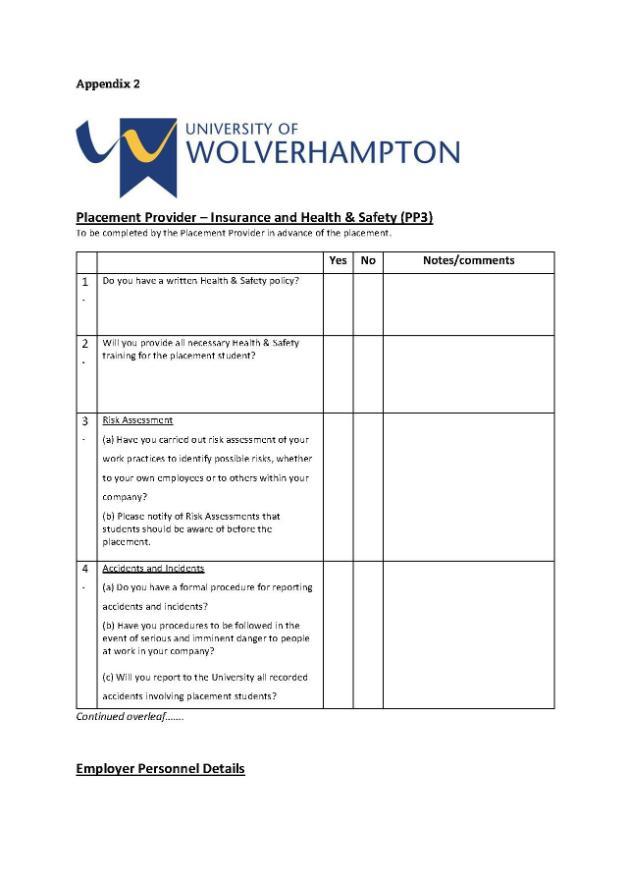
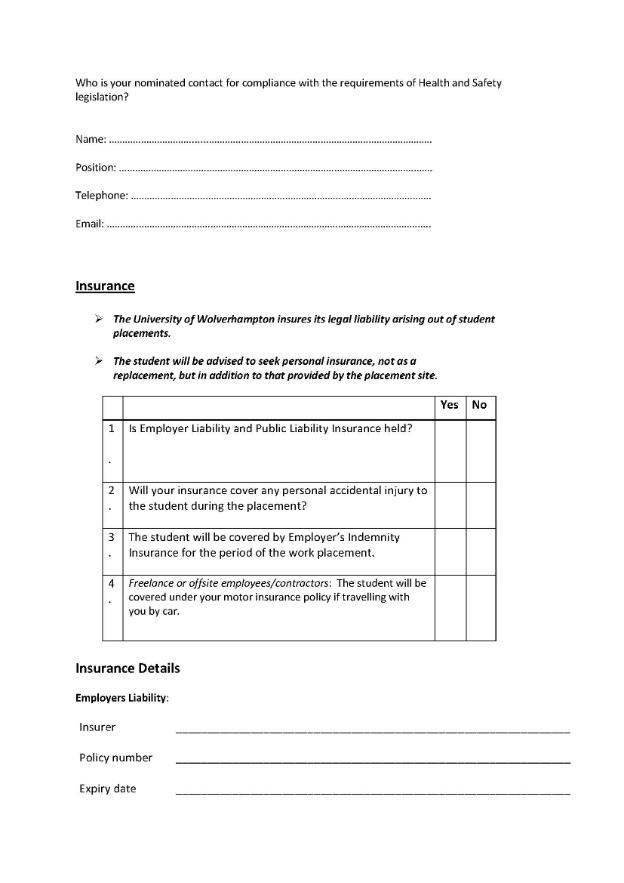
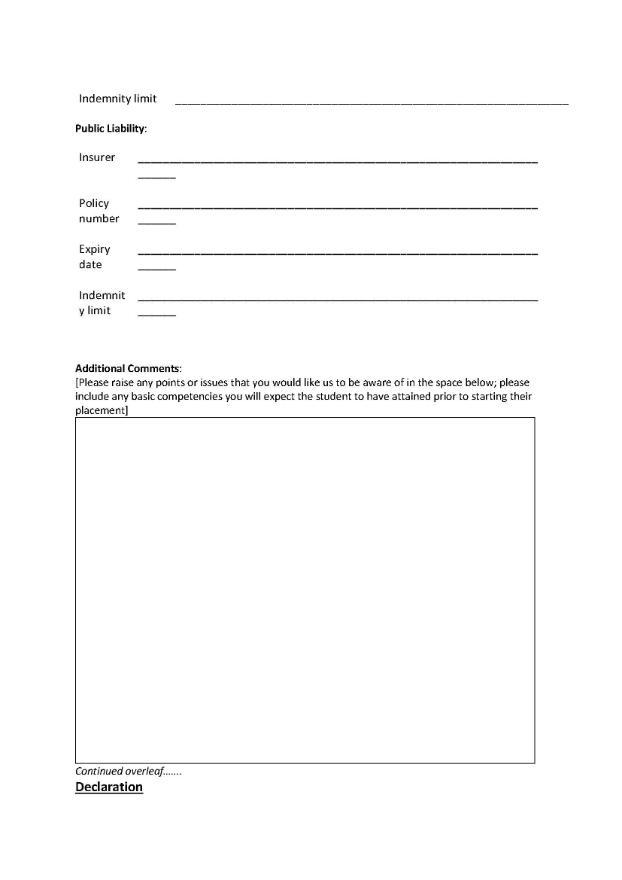
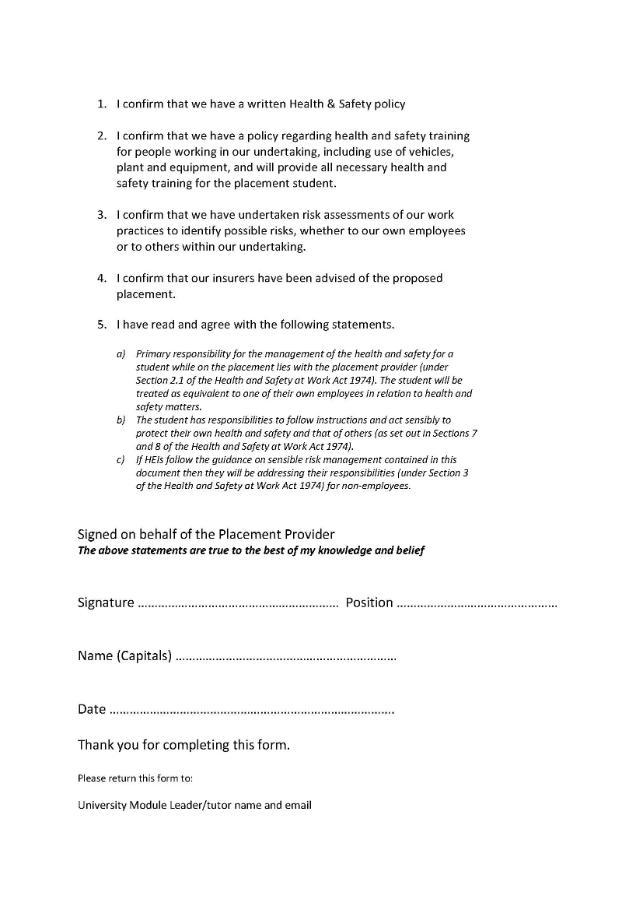

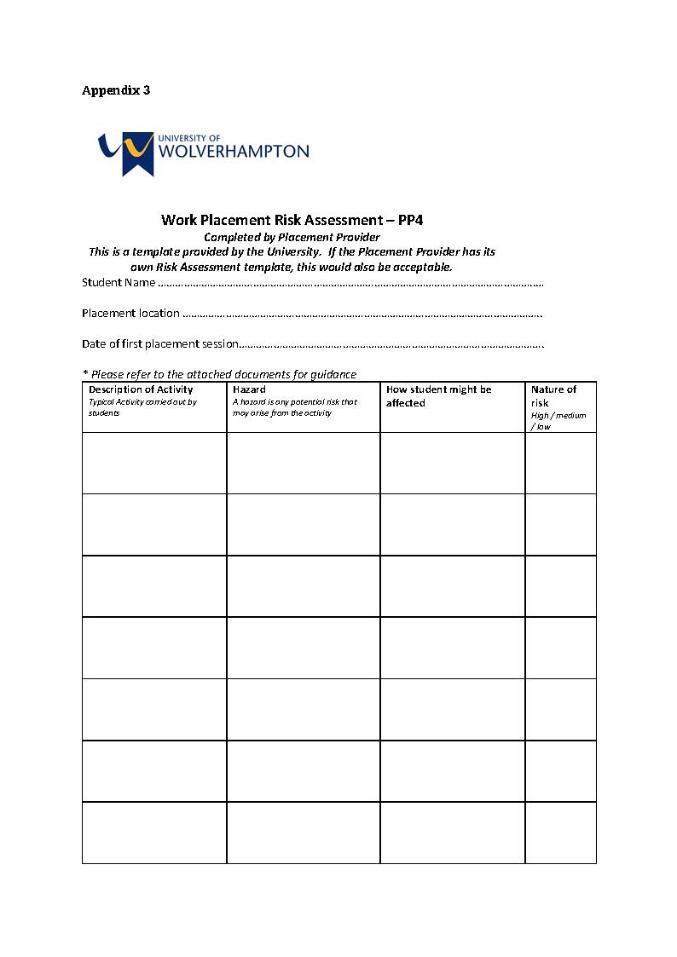
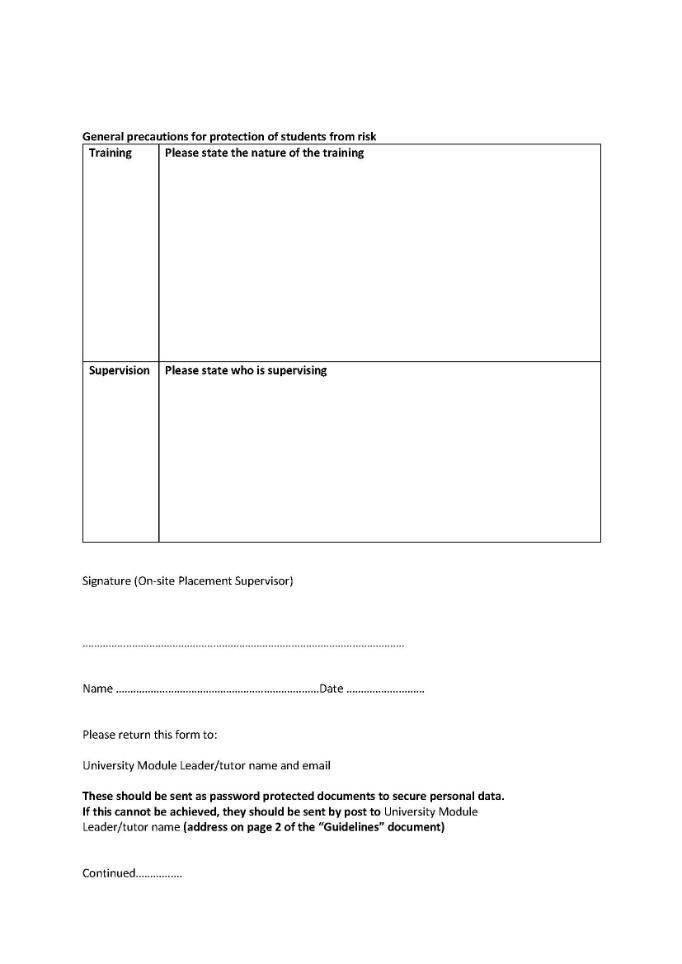
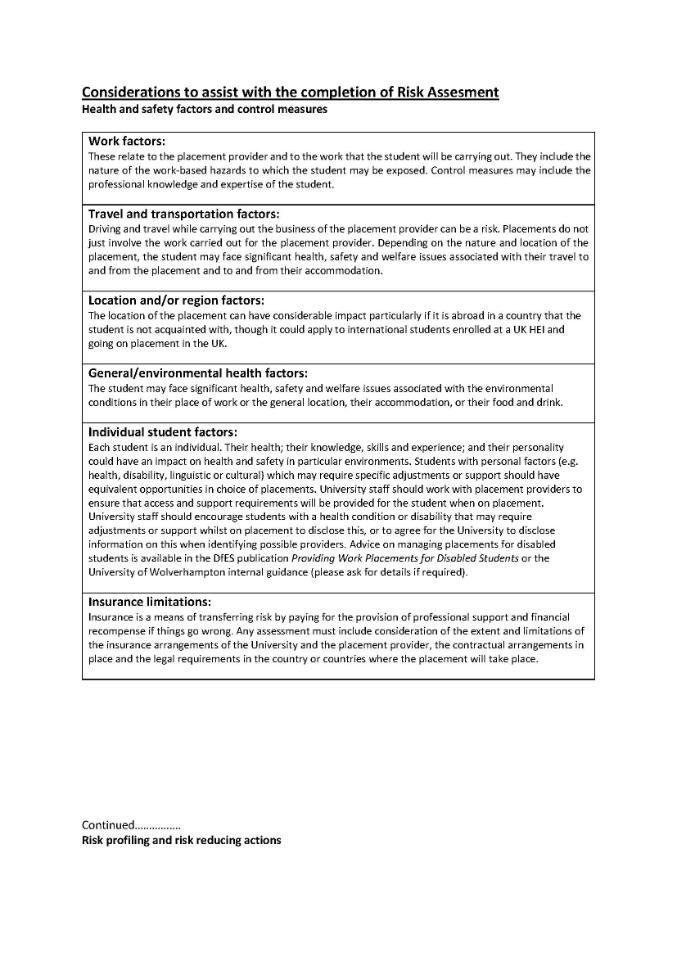
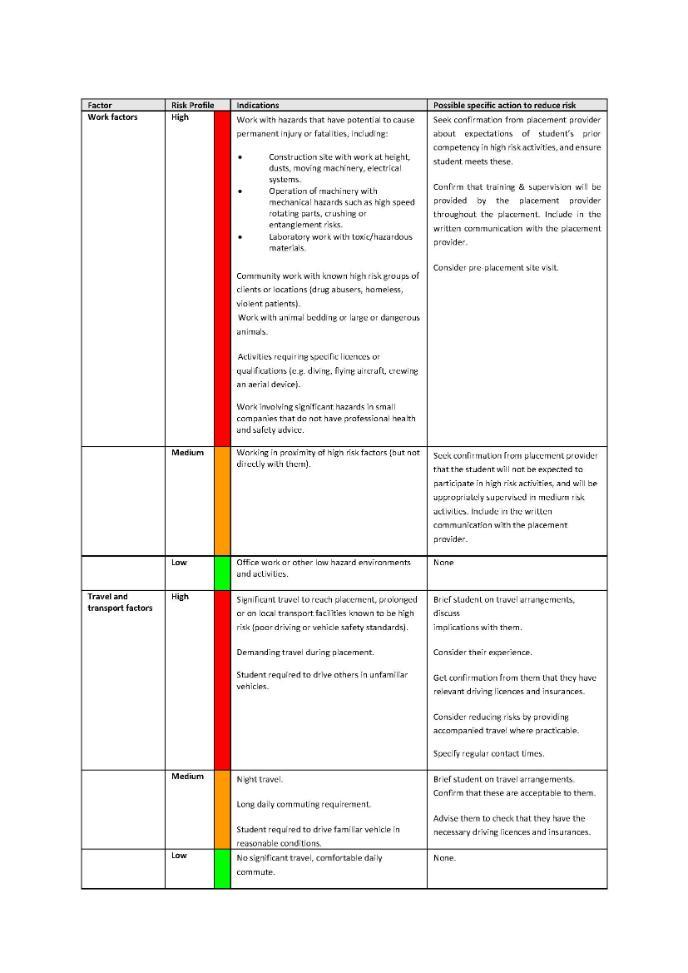
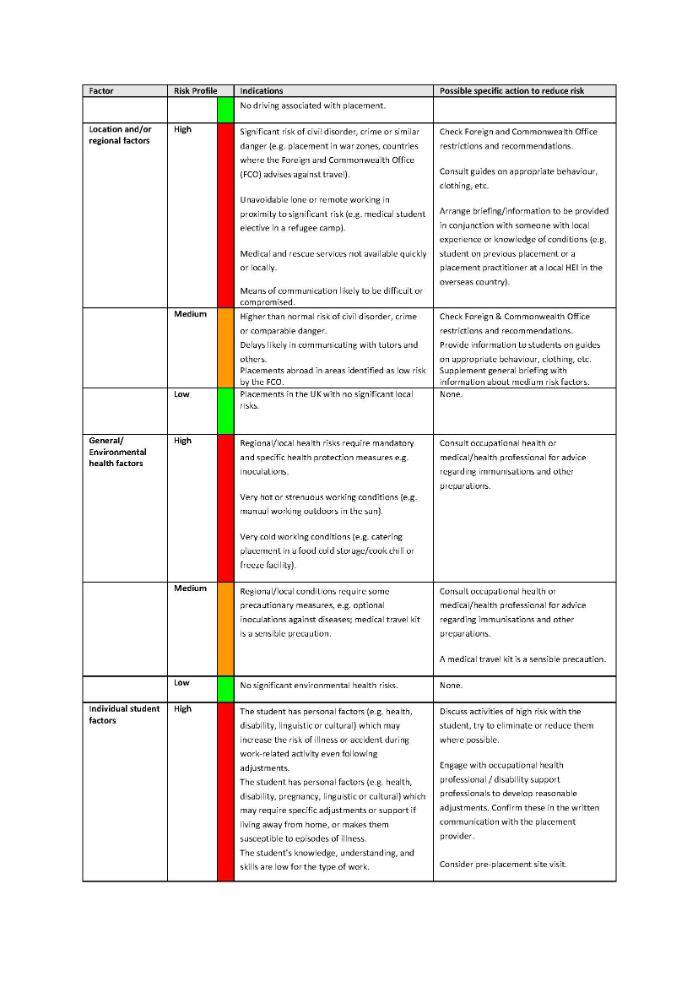
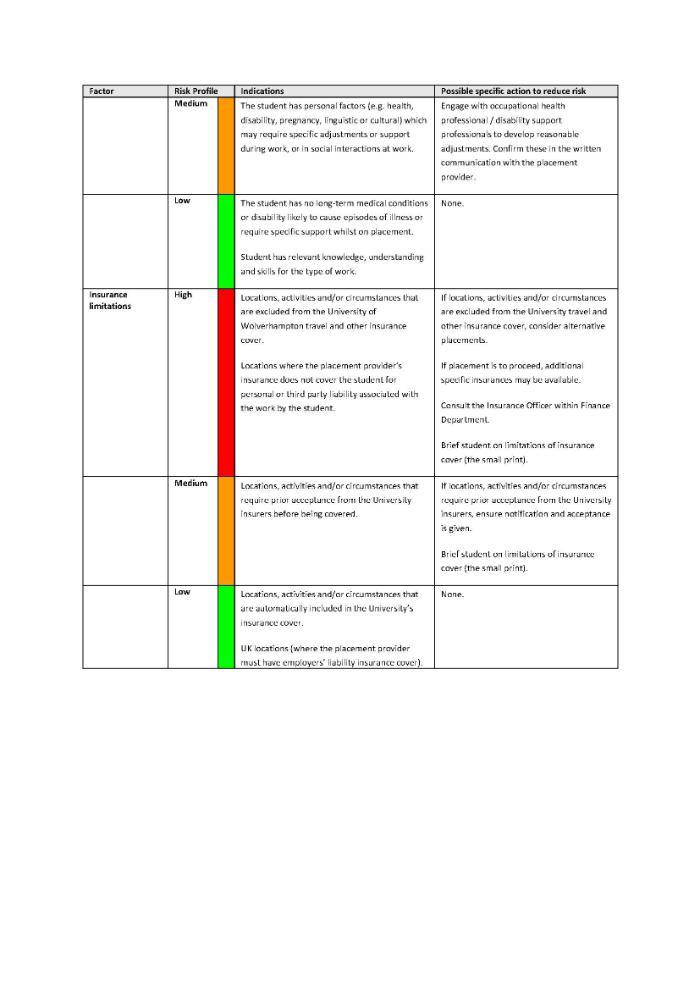
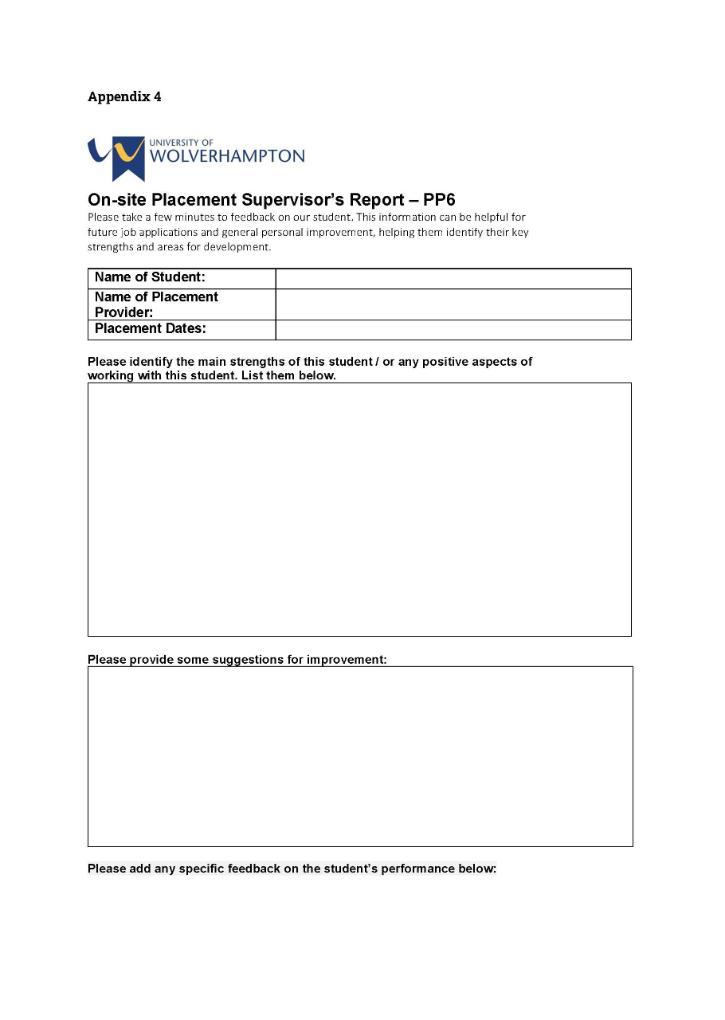
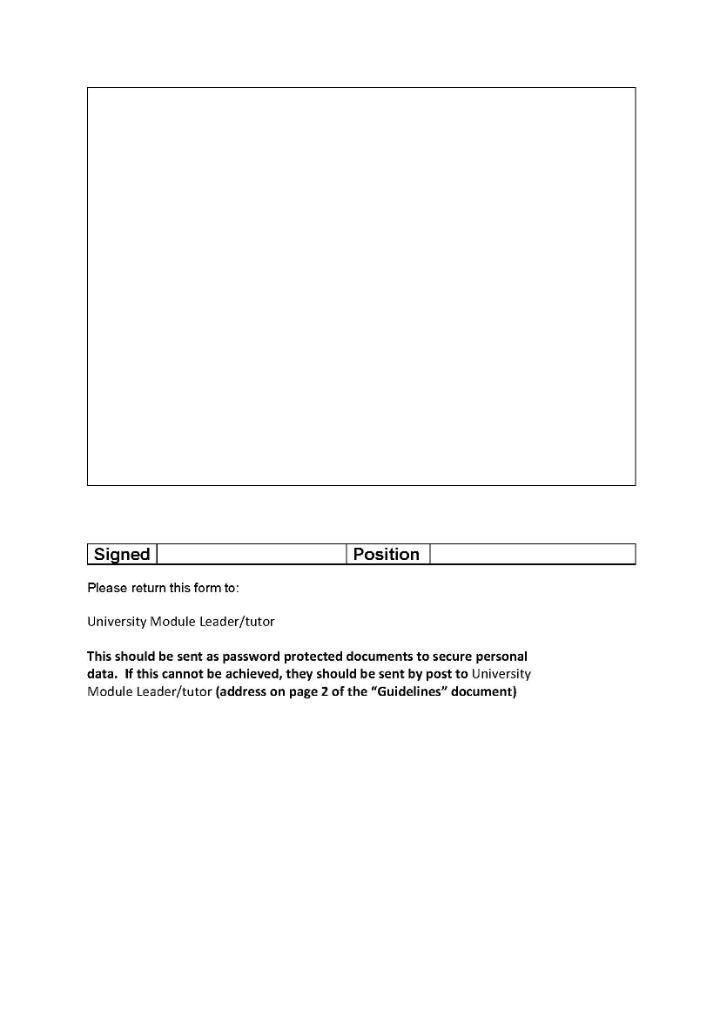
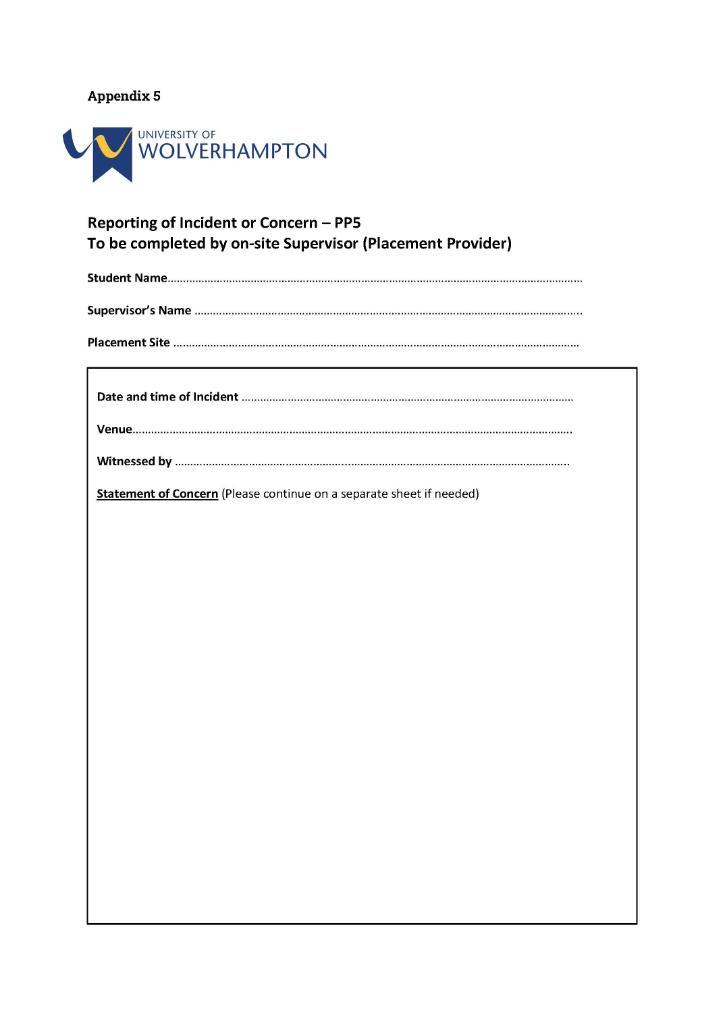
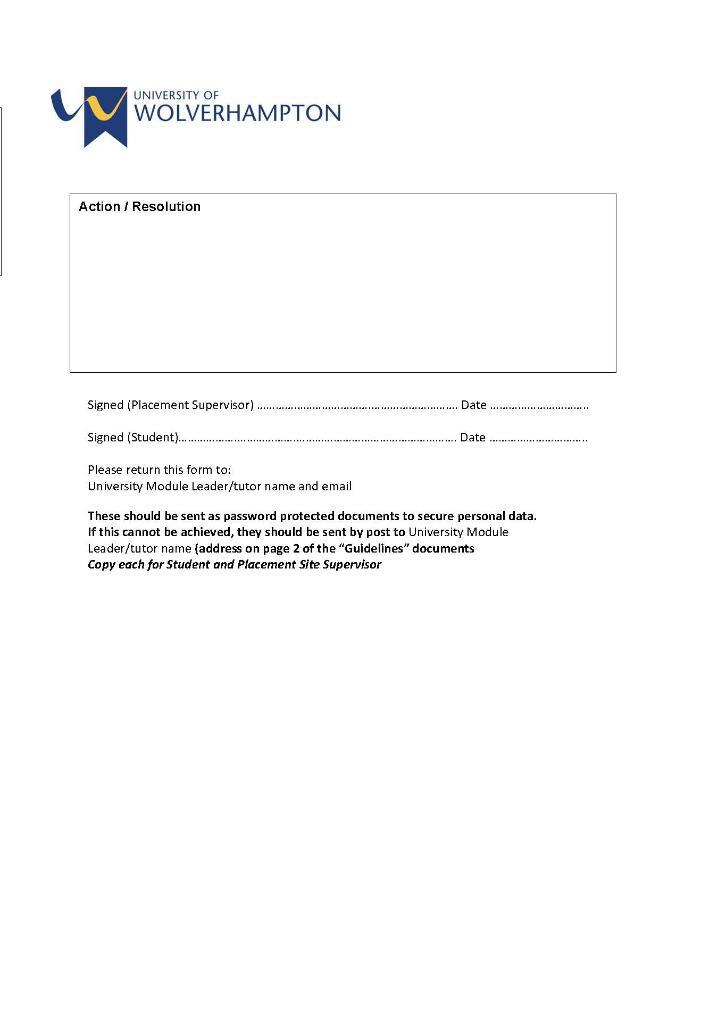
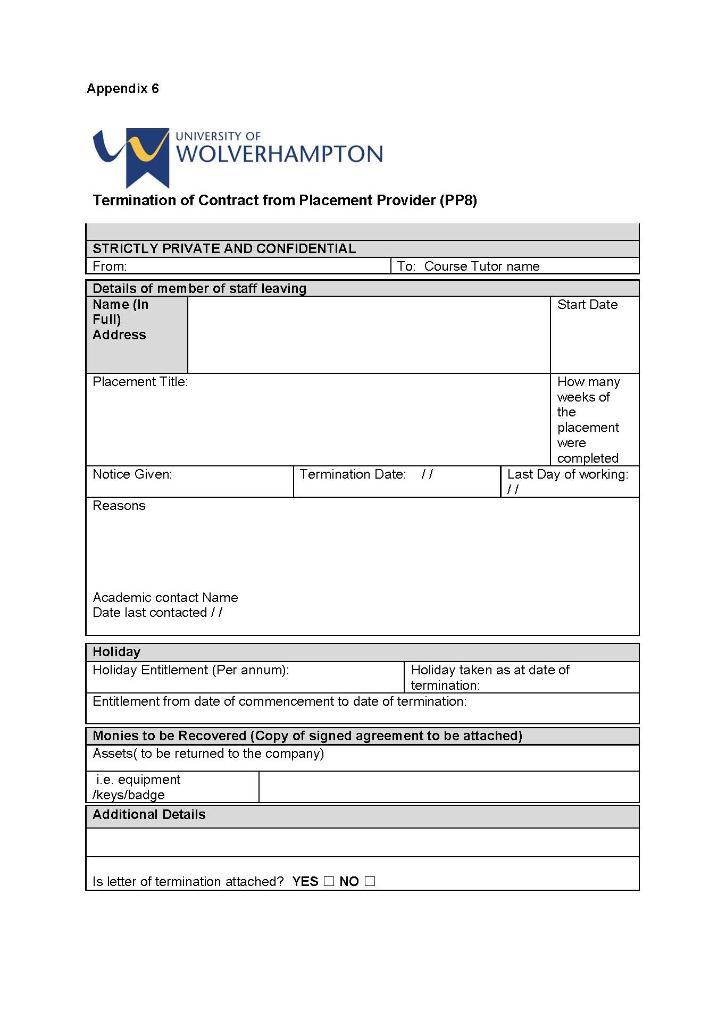



/prod01/wlvacuk/media/departments/digital-content-and-communications/images-2024/240328-Varsity-Line-Up-Resized.jpg)
/prod01/wlvacuk/media/departments/digital-content-and-communications/images-18-19/220325-Engineers_teach_thumbail.jpg)
/prod01/wlvacuk/media/departments/digital-content-and-communications/images-2024/240515-Spencer-Jones-Award-Resized.jpg)
/prod01/wlvacuk/media/departments/digital-content-and-communications/images-2024/240320-Uzbekistan-Resized.jpg)
/prod01/wlvacuk/media/departments/digital-content-and-communications/images-2024/240229-The-Link-Resized.jpg)
/prod01/wlvacuk/media/departments/digital-content-and-communications/images-2024/240516-Andy-Gibson-Resized.jpg)
